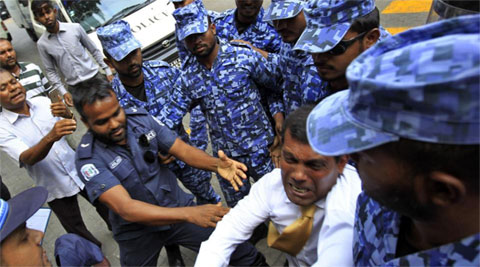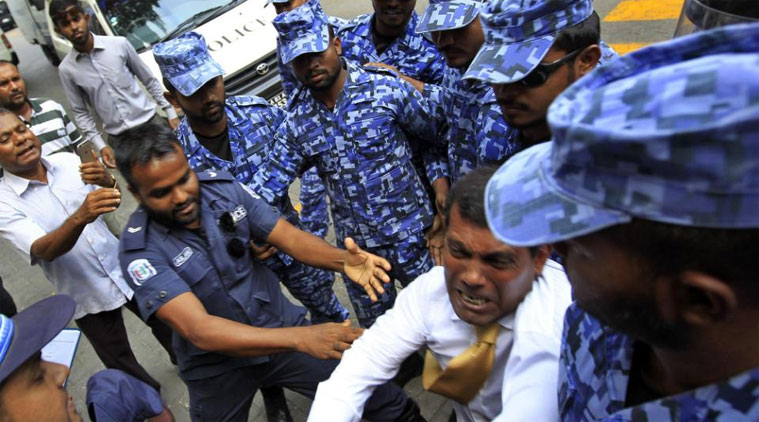Opinion Backward march
The backsliding on democracy in the Maldives should worry India. It cannot afford to look away.

 Former President Mohamed Nasheed, convicted at the end of a terrorism trial internationally condemned as a farce, will emerge from prison in 13 years. (Source: AP photo)
Former President Mohamed Nasheed, convicted at the end of a terrorism trial internationally condemned as a farce, will emerge from prison in 13 years. (Source: AP photo)
For three decades, until 2008, the story goes, paradise was a grim, dangerous place: even the slightest dissent led straight to the dank interiors of Dhoonidhoo prison, banishment to remote islands and torture. Now, seven years down, the Maldives appears to be sliding back into a dystopic past. Hundreds of anti-government protestors — including pregnant women, nursing mothers and senior citizens — have been held for participating in a record 20,000-strong May Day march in Male. The government is reported to have begun sacking opposition-linked workers from public sector jobs; one minister has called for boat-owners who ferried protestors to the May Day protests to be penalised.
Former President Mohamed Nasheed, convicted at the end of a terrorism trial internationally condemned as a farce, will emerge from prison in 13 years — unless international pressure leads the government to ensure due process during his appeal. Leading opposition politicians are also in prison, while credible media accounts have charged government ministers with using street gangs to intimidate dissidents.
Through all this, New Delhi has maintained a stoic — and inexplicable — silence. There are several good reasons why India ought to be telling the Maldives government that its conduct is unacceptable, even outright dangerous. First, the dismantling of the democratic opposition cedes political space to the Maldives’ growing, and violent, Islamists. Hundreds of Maldivians are fighting with jihadist groups in West Asia; their return will, inevitably, pose political challenges to the region that only meaningful democracy will be able to address.
Then, India has a strategic interest in defending democracy at a time when it is under siege across the region. In Bangladesh, Pakistan and Nepal, the idea of democracy is already facing severe tests. Delhi has long held that only stable democracies can move the region forward towards a prosperous and peaceful future. It stands to reason, therefore, that India must be willing to use its diplomatic resources to stand by democratic forces in the Maldives.
India has long hesitated before intervening in its neighbours’ affairs — reluctant to engage in the kind of hectoring it has often resented itself, and sensitive to the fact that foreign intervention can often be counterproductive. However, what’s at stake in the Maldives isn’t just bad behaviour by government that domestic institutions can address. Delhi must make clear to the Maldives’ leadership that they are crossing lines which cannot be violated without consequences.





